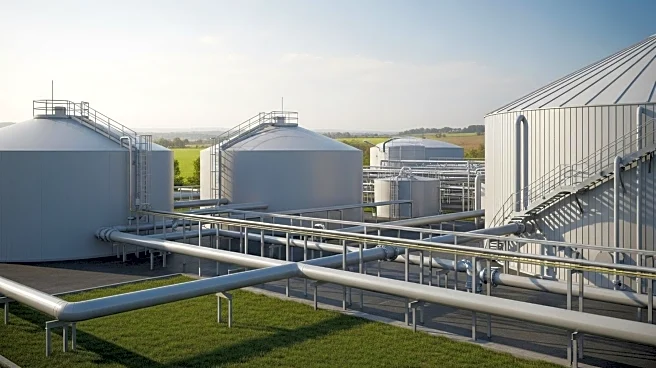What's Happening?
The Stormont Agriculture Committee is set to convene on September 11th to tackle pressing issues in Northern Ireland's agriculture sector. Chaired by Robbie Butler MLA, the committee aims to develop a Nitrates Action Plan, a task previously unmet by Minister Andrew Muir. The committee plans to engage with stakeholders to ensure sustainable solutions for farming and food sectors. Additionally, the committee is exploring anaerobic digestion (AD) technologies as a dual solution for green energy production and water quality improvement. Plans are underway to establish AD hubs across Northern Ireland, utilizing farm waste to produce bio-methane. This initiative is seen as a significant opportunity for local agriculture, with upcoming energy conferences set to highlight the benefits of AD technologies.
Why It's Important?
The development of a Nitrates Action Plan is crucial for Northern Ireland's agriculture sector, which faces challenges related to environmental sustainability and regulatory compliance. The committee's focus on anaerobic digestion technologies represents a strategic move towards renewable energy and waste management, potentially transforming farmers into both food and energy producers. This could lead to economic benefits and environmental improvements, positioning Northern Ireland as a leader in sustainable agricultural practices. The committee's actions may also influence policy changes regarding inheritance tax, which disproportionately affects family farm businesses, highlighting the need for equitable tax measures.
What's Next?
The Stormont Agriculture Committee will continue to scrutinize key issues impacting the agriculture sector, aiming to develop meaningful legislation. The upcoming energy conferences in September will further explore the role of anaerobic digestion technologies, potentially leading to increased adoption and investment in these systems. Stakeholders and elected representatives will likely engage in discussions to address the inheritance tax implications, seeking Treasury recognition of its impact on family farms. The committee's efforts will be crucial in shaping the future of agriculture policy in Northern Ireland.
Beyond the Headlines
The exploration of anaerobic digestion technologies not only addresses immediate environmental and energy concerns but also reflects a broader shift towards sustainable agricultural practices. This initiative could serve as a model for other regions facing similar challenges, promoting a balance between food production and environmental stewardship. The committee's focus on stakeholder engagement underscores the importance of collaborative approaches in policy development, ensuring that diverse perspectives are considered in crafting solutions that benefit the entire sector.









